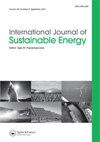家用太阳能发展:改善乌克兰和拉脱维亚国家政策的方法
IF 2.7
Q4 ENERGY & FUELS
引用次数: 6
摘要
本文调查了拉脱维亚和乌克兰家庭推广太阳能的国家政策。本文比较了两国刺激部门发展的不同方法,基于平准化电力成本法和投资项目回收期,评估了太阳能发电厂实施的经济效益。对1至30kW的太阳能发电厂装机容量进行了计算。结果显示,由于各国现有的支持机制,太阳能发展存在根本差异。虽然高上网电价有助于在乌克兰快速部署太阳能发电厂,但拉脱维亚的净计量系统阻碍了家庭太阳能的发展。该研究提出了改进政策的建议,方法是根据降低太阳能成本的趋势调整乌克兰的上网电价,将太阳能纳入拉脱维亚的强制性采购部分,并对两国的太阳能发电厂建设提供优惠的公共融资。重点分析了在乌克兰和拉脱维亚家庭中推广太阳能的国家政策。估计了两国小型太阳能发电厂的经济效率。乌克兰的上网电价确保了太阳能项目的快速回收期。拉脱维亚的净计量不能为太阳能发电厂提供投资吸引力。两国都需要改变能源政策,以实现平衡太阳能开发本文章由计算机程序翻译,如有差异,请以英文原文为准。
Solar energy development in households: ways to improve state policy in Ukraine and Latvia
ABSTRACT The paper investigates state policy to promote solar energy in Latvia’s and Ukraine’s households. Comparing different approaches to stimulating sectors’ development in both countries, the article evaluates the economic efficiency of solar power plants implementation based on the Levelized Cost of Electricity method and investment projects payback periods. The calculations were performed for solar power plants installed capacities ranging from 1 to 30 kW. The results revealed the fundamental differences in solar energy advancement due to the existing support mechanisms in the countries. While high feed-in tariff rates contribute to the rapid deployment of solar power plants in Ukraine’s, Latvia’s net-metering system hinders solar energy development in households. The research forms recommendations for improving policy by adjusting Ukrainian feed-in tariffs to trends in reducing solar energy costs, introducing solar energy in the Mandatory Procurement Component for Latvia, and applying preferential public financing to solar power plants construction in both states. Highlights State policy to promote solar energy in Ukraine’s and Latvia’s homes is analyzed The economic efficiency of small solar power plants is estimated for both countries Feed-in tariff in Ukraine ensures a quick payback period for solar power projects Net metering in Latvia does not provide investment attractiveness of solar plants Both countries need energy policy changes for balanced solar power development
求助全文
通过发布文献求助,成功后即可免费获取论文全文。
去求助
来源期刊

International Journal of Sustainable Energy
ENERGY & FUELS-
CiteScore
5.70
自引率
3.20%
发文量
52
期刊介绍:
Engineering and sustainable development are intrinsically linked. All capital plant and every consumable product depends on an engineering input through design, manufacture and operation, if not for the product itself then for the equipment required to process and transport the raw materials and the final product. Many aspects of sustainable development depend directly on appropriate and timely actions by engineers. Engineering is an extended process of analysis, synthesis, evaluation and execution and, therefore, it is argued that engineers must be involved from the outset of any proposal to develop sustainable solutions. Engineering embraces many disciplines and truly sustainable solutions are usually inter-disciplinary in nature.
 求助内容:
求助内容: 应助结果提醒方式:
应助结果提醒方式:


